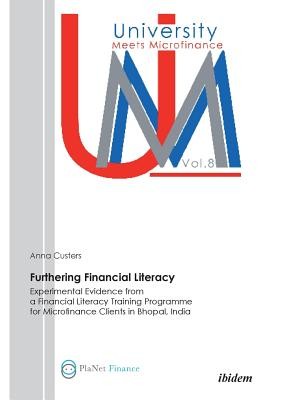
- We will send in 10–14 business days.
- Author: Anna Custers
- Publisher: Ibidem Press
- ISBN-10: 3838203372
- ISBN-13: 9783838203379
- Format: 14.8 x 21 x 0.4 cm, minkšti viršeliai
- Language: English
- SAVE -10% with code: EXTRA
Furthering Financial Literacy. Experimental Evidence from a Financial Literacy Training Programme for Microfinance Clients in Bhopal, India (e-book) (used book) | bookbook.eu
Reviews
Description
Anna Custers' study presents evidence from a randomised field experiment that was conducted in Bhopal, India. It delivers a two-fold contribution to the burgeoning field of financial literacy theory. Firstly, it investigates a specific link in the theoretical mechanism between financial literacy and household well-being. Where most financial literacy research focuses on the link between financial literacy training and demand for financial services, Custers deals with the question whether financial literacy training affects financial literacy levels. The results of her experiment show that a financial literacy training programme for urban microfinance clients positively affects average financial literacy levels.Secondly, Custers' study investigates a relatively under-researched topic, in particular for developing countries: The effect of trainer gender on learning outcomes and learning perceptions. She asks whether a differential design of a financial literacy training programme, based on trainer gender, differently affects financial literacy levels and learning perceptions among microfinance clients. The results of the experiment suggest it does not matter whether male or female trainers are employed.The results of her study provide an essential contribution to identifying the best strategies for improving the financial literacy of the poor. Custers' conclusion that specifically tailored instruction programmes, irrespective of trainer gender, can greatly improve financial literacy levels is highly relevant to both academia and professionals working in the field of financial literacy.
EXTRA 10 % discount with code: EXTRA
The promotion ends in 21d.13:55:50
The discount code is valid when purchasing from 10 €. Discounts do not stack.
- Author: Anna Custers
- Publisher: Ibidem Press
- ISBN-10: 3838203372
- ISBN-13: 9783838203379
- Format: 14.8 x 21 x 0.4 cm, minkšti viršeliai
- Language: English English
Anna Custers' study presents evidence from a randomised field experiment that was conducted in Bhopal, India. It delivers a two-fold contribution to the burgeoning field of financial literacy theory. Firstly, it investigates a specific link in the theoretical mechanism between financial literacy and household well-being. Where most financial literacy research focuses on the link between financial literacy training and demand for financial services, Custers deals with the question whether financial literacy training affects financial literacy levels. The results of her experiment show that a financial literacy training programme for urban microfinance clients positively affects average financial literacy levels.Secondly, Custers' study investigates a relatively under-researched topic, in particular for developing countries: The effect of trainer gender on learning outcomes and learning perceptions. She asks whether a differential design of a financial literacy training programme, based on trainer gender, differently affects financial literacy levels and learning perceptions among microfinance clients. The results of the experiment suggest it does not matter whether male or female trainers are employed.The results of her study provide an essential contribution to identifying the best strategies for improving the financial literacy of the poor. Custers' conclusion that specifically tailored instruction programmes, irrespective of trainer gender, can greatly improve financial literacy levels is highly relevant to both academia and professionals working in the field of financial literacy.


Reviews